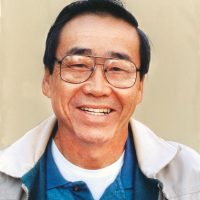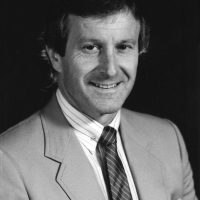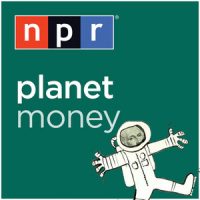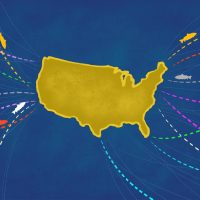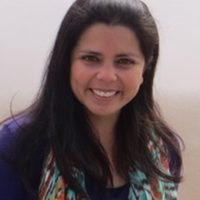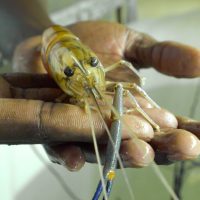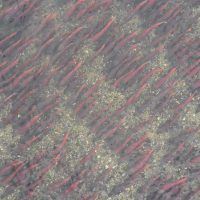Filter Results
Remembering Ken Chew: A Collection of Memories
Ken was a visionary, a valued colleague, and a mentor and friend to many. His fierce advocacy for sustainable aquaculture has had considerable impacts on industry and on state, regional, and federal agencies and policies. Many of these impacts are based on the relationships that Ken developed with state and federal legislators and regulators, seemingly effortlessly. His passion for shellfish and the achievements of his research program still resonate, and his legacy is reflected in and respected by the vibrant community of shellfish researchers and shellfish growers on the west coast and elsewhere in the United States.
Read moreIn memory of Ernie Brannon
SAFS Professor and alumnus Ernest L. (Ernie) Brannon passed away in Moscow, Idaho, on March 10 after a period of declining health. He received his PhD from the UW in 1972 under the supervision of Dr. Lauren “Doc” Donaldson.
Doc had established the College of Fisheries’ experimental salmon and trout hatchery and developed a selective breeding program for salmonids. After Doc’s retirement, Ernie Brannon was hired on the teaching faculty in 1973 and also assumed leadership of the experimental hatchery.
Time-traveling parasites: Chelsea Wood wins NSF CAREER Award
SAFS Associate Professor Chelsea Wood is the recipient of a 2022 CAREER Award from the National Science Foundation (NSF). This prestigious award will support Wood’s novel research on the historical ecology of parasitism and will allow her to create an active-learning, open-access version of her undergraduate parasite ecology course.
Read moreChris Anderson featured on NPR’s “Planet Money” podcast
Professor Chris Anderson was featured on NPR’s Planet Money podcast – a show that aims to take complex economic issues and make them approachable for all audiences. On the show, Chris answers a listener’s question on the environmental footprint of shipping tuna across the ocean.
Listen to the podcast
Chelsea Wood featured on podcast “Science Rules! with Bill Nye”
When it comes to things that give us the heebie-jeebies, parasites reign supreme. However, they are a necessary part of our ecosystems. SAFS assistant professor Chelsea Wood joins Bill Nye on his “Science Rules!” podcast to explain what makes parasites so creepy, how to prevent them from killing us, and why she keeps digging around in decades-old cans of salmon.
Read moreThe US imports about 62-65% of its seafood
Global trade is much more prominent in recent years, and related statistics have been used to justify many policy positions. For seafood trade, though, it is quite difficult to piece together how much of the seafood eaten in the US was originally caught in the US. A new study now examines these complexities, finding that about 62-65% of seafood comes from foreign sources, much less than the widely reported 90% that is often cited.
Read moreDr. Jacqueline Padilla-Gamiño Honored at Latinx Faculty Recognition Event
We are proud and thrilled to share the news that School of Aquatic and Fishery Science faculty member Dr. Jacqueline Padilla-Gamiño has been selected by the Latino Center for Health at UW to be recognized at the Latinx Faculty Recognition Event. This annual event honors the scholarly achievements of Latina and Latino faculty across the tri-campuses of the University of Washington for the academic year 2018-2019.
Read moreMark Scheuerell named new Assistant Unit Leader, USGS Washington Cooperative Fish and Wildlife Research Unit
SAFS is excited to announce that Mark Scheuerell will be joining us as the USGS Washington Cooperative Fish and Wildlife Research Unit’s new Assistant Unit Leader and as an Associate professor.
Read moreProtected by Prawns
In rural communities across the tropics, a parasitic disease called schistosomiasis that is carried by freshwater snails currently infects more than 220 million people, rivaling malaria in its prevalence. Capable of residing in an infected human for more than 30 years, the Schistosoma parasite can cause debilitating and often-fatal health complications, including liver failure, bladder cancer, and an increased risk of AIDS. An estimated 280,000 people in Africa alone die each year from the disease. Despite 50 years of medical intervention and the availability of a relatively inexpensive and effective drug, the disease has stubbornly resisted eradication efforts, largely due to the ease with which the parasite reinfects its human hosts.
Read moreWisdom of Crowds: A Conversation with Andrew Berdahl
In 1906 while attending a livestock fair in Plymouth England, Sir Francis Galton witnessed an interesting contest where locals were trying to guess the correct weight of a slaughtered and dressed ox (think jellybeans in a jar, but for butchers). He examined all 800 guesses and calculated the median calling it the vox populi, or “voice of the people,” reasoning that this would cancel out outliers on either side of the true answer. Astonishingly, the median guess was extremely close–within .8%–of the weight measured by the judges and closer than any individual guess. “This started the idea of the wisdom of crowds, where if you have a whole bunch of independent guesses you can average them, cast off the errant guess on either side and hone in on the right answer,” said Dr. Andrew Berdahl one of the University of Washington School of Aquatic and Fishery Sciences’ newest faculty members.
Read more